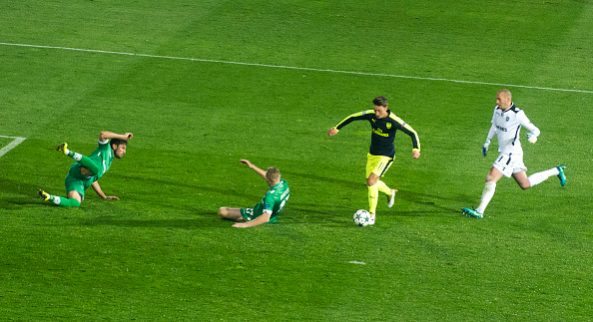There is only one thing on the mind of Arsenal fans at the moment, and amazingly, it’s not Tottenham, even though the North London derby is this weekend.
It is, of course, this;

Arsenal fans didn’t need a reason to defend how good Mesut Özil is, we all know how good he is. But that goal was a ten-second summation of the calibre of footballer that Özil is, and it might turn out to be the defining moment of his Arsenal career.
Yes, it’s that important.
There is a key difference between those who are extremely talented at their job, and those who are the best at it. There are those who can do something 100 times a minute with consummate ease, but can’t do it on command at a moment’s notice.
There are those that are talented enough to be the best in the world at what they do, but for one of a litany of reasons, it doesn’t happen.
Winning
What is the key difference between an extremely talented footballer and a truly world-class one? Talented footballers contribute towards you winning games. World-class footballers win games for you.
It’s a subtle, yet critical difference, and it is one that defines how teams react to playing against them.
Once someone shows that they are capable of winning big games on their own, teams prepare differently for them. That player goes from being part of a team that needs to be prepared for, to being a focus point themselves.
Taking that player out of the game becomes just as important as playing to your own strengths. And as good as Özil has been so far for Arsenal, he never displayed that he could win a game by himself. Özil drew massive respect from opposition defences, but fear? No.
There was never that one moment that you could point to where Özil was the single reason why Arsenal won a game. He’s brilliant at helping others win games, in fact he’s the best in the world at it, but he had never won a game for Arsenal by himself. There was never a game in which he was the only reason that Arsenal won.
So when he gets the ball thirty yards out from goal, whilst there’s always a possibility that Arsenal are about to score, it’s far less likely that Özil will both create the opportunity and score it himself. Fans know this, and the opposition knows this, so eyes move towards the players that Özil can give the ball to, and away from Özil himself.
He’s a threat, but not the threat.
Give me one moment in time
However, it only takes one moment of brilliance, one unarguable, world-class, crucially important, match-winning piece of skill to change that perception.
Statistics are important, and consistently good performances will always garner respect, but a player will never be feared as a world-class match winner until we all see it happen in front of us. Perception is key, and we had never seen Özil single-handedly win a game that mattered in a fashion that was simply brilliant.
There was never a moment like Steven Gerrard’s goal against Olympiakos, or Wayne Rooney’s overhead kick vs Manchester City, or Robert Pires’ lob over Peter Schmeichel at Villa Park, or Luis Suarez’ fifty yard volley at Carrow Road, or any of Alexis Sanchez’s thunderbolts into the middle of the net from twenty yards out against Liverpool, Manchester United and Aston Villa:.
That moment that changed the way you thought about a player, it stopped you from thinking that this player is really, really, really good and made you think that he’s far better than that.
Now, Özil has that perception-changing event on his CV.
The premise that he can’t win a game through one piece of individual magic is now moot. Any suggestion that he doesn’t have it in his game to win an important fixture when only given one chance to do so is now redundant because we just saw him win an important fixture when given only one chance to do so.
Gravity
There is a term in the NBA called ‘gravity’. It pertains to the effect that a player has on the defence in front of him, and how much stronger that ‘gravity’ gets depending on how much that defence thinks a player can hurt them. If a player is a great shooter or passer, the defence will swarm around him. If he isn’t, the defence will sit back and give him room safe in the knowledge that he won’t hurt them when he has the ball.
Whenever Özil got the ball, defences didn’t fear him in the same way they feared Alexis, so they dropped back a bit.
Can they afford to do that now?
Probably.
One example of winning a game by yourself doesn’t establish a pattern. But it does sow the seed of doubt into a defender’s mind.
Before Ludogorets, there was no reason to fear Özil as a match winner. But now? Now they’ll have to be that little bit more cautious just in case. It might only be a half-second delay in getting into position, or making a tackle, but it’ll happen more often now, just because of the possibility of Özil doing something similar again.
For two and half years, we’ve seen how teams defend against Arsenal when they think they only have to stop Alexis from getting the ball in order to beat us. It’s easy to defend against one world-class match winner. It’s nigh on impossible to defend against two of them without completely changing the way you play yourself, compromising your own chances of winning in the process.
Alexis has shown that he can win games by himself.
Now, Mesut Özil has done so too, and it may prove to be the starting point of his best days in an Arsenal shirt because of it.

